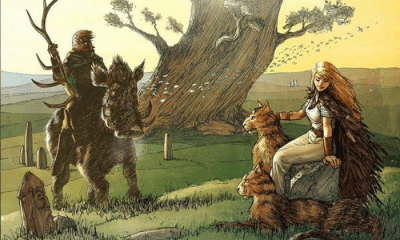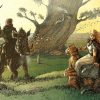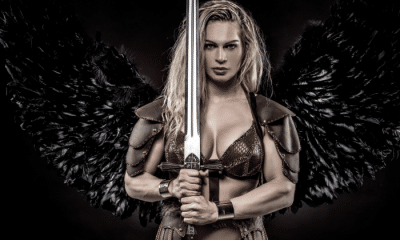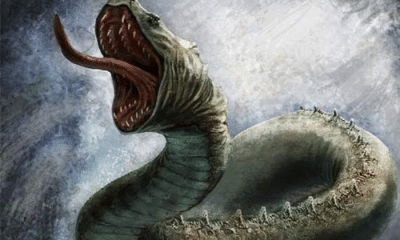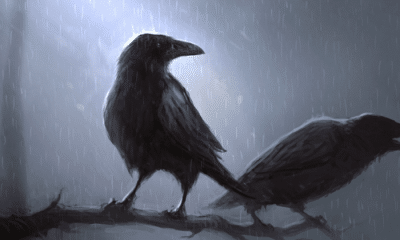Norse
Loki and the Dwarves
The story of Loki and the dwarves in one in which the Norse trickster obtains some of the gods’ most famous possessions through deceit and clever words.
Loki was known for causing trouble among the gods. They tolerated this, however, because he often made up for it with great gifts and favors.
This was the case when he cut off Sif’s hair, angering Thor. He promised a replacement from the dwarves, and was given even more gifts by the great craftsmen.
Loki’s greed and love of mischief, however, made him try for even more magical creations from the dwarves. He made a potentially costly bet, but relied on tricks and wit to ensure that he would not have to pay.
Loki’s Wager with the Dwarves
One day, the trickster Loki cut off the beautiful golden hair of Sif, Thor’s wife, as she slept. Thor was enraged, but Loki offered to go to Svartalfheim, the home of the dwarves, to have them create a replacement.
Thor allowed this after being told that Sif’s new hair would be of real gold, and thus even more beautiful and luxurious than her natural hair. Loki went to the dwarf Ivaldi with his request.
Ivaldi’s sons made not only new hair for Sif, but other gifts for the gods as well. They created Skiðblaðnir, a blessed ship that could be folded small enough to fit in a pocket when not in use, and Gungnir, the deadliest spear ever created.
Loki had not made enough mischief for the day, however, and decided to see what else he could get from the dwarves.
He went to two dwarven brothers, Brokkr and Sindri, and bet them that they could not craft gifts that would rival those of Ivaldi’s sons. If they could, Loki said they could cut off his head.
A fly bit Sindri’s hand as he created the first item, but he was unphased by this. He made Gullinbursti, a golden boar who was swifter than any horse.
Next, Brokkr created Draupnir, a golden ring that created eight new rings of gold ever nine nights. Although a fly bit his neck as he worked, Draupnir was perfect.
As Brokkr began to work on their final gift, the same fly stung his eyelid. His eye swelled, obscuring his vision, but he continued to work.
The result was Mjöllnir, a great battle hammer that never missed its target and flew back to its owner’s hand after it hit. Because he was blinded by the fly’s sting, however, the hammer’s handle was slightly too short for it to be perfect.
The fly, of course, had been Loki in disguise. Although his first two attempts to distract the brothers from their work had failed, he was certain that the hammer’s imperfect hammer would save him from paying up on his wager.
Loki was confident that he had both appeased Thor and earned great gifts for the gods at no cost to himself. He returned to Asgard and presented his six gifts to Thor, Odin, and Freyr.
Thor received Sif’s new hair and Mjöllnir. Odin took the spear and Draupnir, while Freyr got the magical ship and the great boar.
Although Mjöllnir’s handle was slightly too short is was a marvelous weapon, so Brokkr and Sindri were confident that they had won the wager. The gods agreed that their works were the equal of the others and told Loki to give up his wager.
The two dwarves pulled out their knives to cut off Loki’s head, but the cunning trickster pointed out that there was no way they could do so. He had wagered his head, not his neck, so if they removed even a bit of his neck they would be in violation of the wager.
Brokkr and Sindri could see no way around Loki’s argument so they were forbidden from taking his head. They instead sewed his mouth shut to keep him from causing more mischief with his deceptive words.
My Modern Interpretation
Loki’s wager is a classic example of how tricksters in mythology often use mischief and wordplay to both frustrate and benefit the gods.
Like Hermes stealing Apollo’s cattle, Loki’s only reason for cutting off Sif’s hair was to cause mischief. He then, as is common for trickster gods, used his quick-thinking to find a way out of the trouble he had caused.
In doing so, he gave the gods some of the items that were most closely associated with them. Gullinbursti, for example, became Freyr’s steed and Mjöllnir was so central to Thor’s cult that it was one of the most frequently-used symbols in Norse art.
A common theme in stories of tricksters is that they are able to remove themselves from an immediate threat, but often create more problems for themselves by continuing to cause trouble.
Had Loki accepted the first three gifts and immediately returned to Asgard, the gods would have been satisfied. He already received two more magical items than he had promised, but his love of mischief made him press for more.
The story of Loki’s wager with the dwarves is one in which the trickster escalates the situation because he is confident that he can use his wits to find his way out.
To do this, he uses a familiar plot device known as a quibble. He uses an exact condition of a bargain to avoid fulfilling its intended meaning.
Loki’s wager likely influenced one of the most famous quibbles in English literature.
In The Merchant of Venice, Shylock is entitled to take a pound of flesh from Antonio. Portia, however, points out that Shylock is not entitled to any blood, making it impossible to remove the flesh.
Loki’s wager is such a classic example of this that the term is sometimes used to refer to a very specific type of quibble. In rhetoric, Loki’s Wager is the insistence, however unreasonable, that if a subject cannot be defined it cannot be discussed.
Because it is impossible to define the separation between the head and the neck, no amount of discussion between the gods and the dwarves could ever solve how to remove Loki’s head without taking part of his neck as well.
In Loki’s stories, he often escapes the worst possible consequences of his actions but is still punished in some way. Sewing up his mouth was not part of the original agreement, but it was the punishment for the way in which he used his clever words to cause trouble for others.
In Summary
When the trickster Loki cut off Sif’s golden hair, he promised to obtain a replacement from the dwarves to avoid Thor’s anger.
The sons of Ivaldi made beautiful hair of pure gold. They also gave him a magical ship and a finely-crafted spear.
Loki was not done causing trouble, however, so he bet two other dwarves that they could not make anything as fine as Ivaldi’s sons had. He would let Brokkr and Sindri cut off his head if they won the bet.
The brothers made fine items, but Loki disguised himself as a fly to distract them from their work. As a result, the handle of Mjöllnir was slightly too short to be perfect.
Despite this, Thor and the other gods declared that the brothers’ creations were at least equal to Ivaldi’s.
Loki argued, however, that it was impossible to cut off his head because he had not wagered any of his neck as well. This quibble is an example of the type that was used by many sly characters in literature and folklore, including in Shakespeare’s Merchant of Venice.
Loki did not completely escape punishment, however. His mouth was sewn shut as a warning against using his clever words to avoid consequences again.


